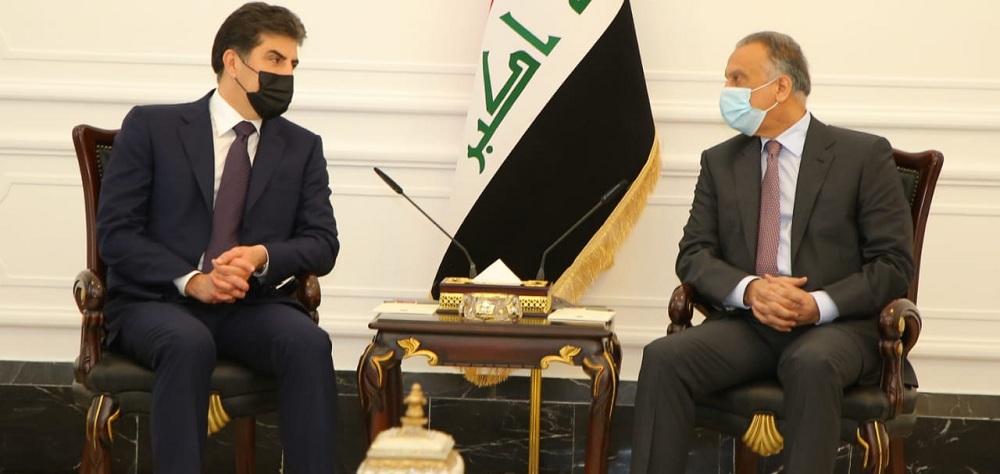Alwaght- In post-ISIS period, not only the political conditions of Iraq did not move towards stability but also already-existing crises grew even bigger.
Meanwhile, one of the issues that remains unsolved is the disputes between the central government in Baghdad and the Kurdish autonomous region north of the country. Their disputes appeared since 2005, the year a new constitution was approved and the country embraced a new period with a new government. Several rounds of talks between Baghdad and Erbil have so far failed to find an ultimate solution to disputes.
Despite that, the important point is that neither Baghdad nor the Kurdish Regional Government (KRG) closed the door of negotiations over the disputes. During all these years, they several times held talks to address the standoff.
As part of the efforts to find a solution, the KRG President Nechirvan Barzani on Sunday visited Baghdad for talks with the central government officials. Upon his arrival, Barzani met with Prime Minister Mostafa al-Kadhimi, President Barham Saleh, and Parliament Speaker Mohamad al-Halbousi.
Now the question is what is taking him to Baghdad and what have they talked about?
Budget crisis is a central theme of talks
Definitely, the budget crisis and talks surrounding the economic conditions of the country and the autonomous regions is the key topic of discussion with Baghdad officials. The fact is that over the post-Saddam years, the budget share of the Kurdish region has been a sticking point between Baghdad and Erbil.
Since 2003, the KRG was paid 17 percent of the federal budget as its share. But members of Iraqi parliament have always argued that the share was more than what the KRG really needed with regard to its population and expenses.
At the same time, there was an argument over the energy resources. The two sides were at loggerheads over the Kurdish oil production and sales which Baghdad argued was illegal and against the agreements reached with the Kurdish leaders. The region signed contracts with foreign companies to produce oil from the disputed regions without Baghdad authorization.
The Erbil rejection of Baghdad conditions and demands concerning the energy sales finally triggered punitive actions against the KRG. In late 2013, the government of PM Nouri al-Maliki cut off the region’s budget share. This punishment continued during the premiership of Haider al-Abadi.
When Adel Abdul Mahdi followed al-Abadi as PM in 2018, a window for improvement of bilateral relations was opened. As a result, an agreement was reached according to which the Kurdish government took a commitment to deliver 250,000 oil barrels daily to the State Organization for Marketing Oil (SOMO) and Baghdad promised to pay $450,000 million monthly as state workers salary to the KRG.
The collapse of the oil income over the past months due to the oil prices slump and also coronavirus pandemic outbreak forced Baghdad to once again cut off the payments to the Kurdish region, afresh pushing the KRG into difficulty paying the state employees.
By this visit, Barzani hopes to strike a deal with al-Kadhimi on the budget share. But the central government has made it clear that the Kurdish government should deliver all of its oil, border, and customs income to Baghdad if it wants its payments back.
Turkish attacks on northern Iraq
Another reason taking Kurdistan’s president to Baghdad is the recent attacks by neighboring Turkey on positions in northern Iraq. Currently, the Turkish forces are operating 190 kilometers deep into the Iraqi territories under the excuse of fighting Kurdistan Workers Party (PKK) which is blacklisted a terrorist organization by Ankara. On June 15, the Turkish military launched Operation Claw-Eagle (also Operation Claw-Tiger) against Kurdish militants in the north. Special forces were airlifted and deployed overland to the border region of Haftanin in the early hours of Wednesday for Operation Claw-Eagle. The campaign targeted 150 suspected PKK positions and was supported by jets, helicopters, drones and artillery, the Turkish defense ministry said.
The Turkish government said it plans to set up new military bases in northern Iraq. This is making a topic for Baghdad-Erbil negotiations to put pressures on Ankara in defense of the Iraqi national sovereignty and territorial integrity.



























